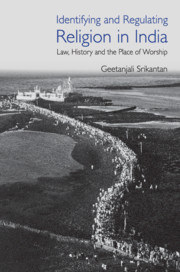Book contents
- Frontmatter
- Contents
- Acknowledgements
- Introduction
- 1 Secularisation and Theologisation: The Making of ‘Hindu Law’ and British Colonialism
- 2 The Role of Legal Hermeneutics as Secularisation in the Formation of Anglo-Muhammadan Law
- 3 Influences and Confluences: The Theological Foundations of Western Property Law and the Place of Worship in India
- 4 Identifying ‘Doctrine’: Tracing Theologisation in Legal Narratives of the Place of Worship in India
- 5 Rethinking Definitions: Hinduism as Religion in the Indian Supreme Court
- Conclusion
- Glossary
- List of Cases
- Bibliography
- Index
1 - Secularisation and Theologisation: The Making of ‘Hindu Law’ and British Colonialism
Published online by Cambridge University Press: 30 April 2020
- Frontmatter
- Contents
- Acknowledgements
- Introduction
- 1 Secularisation and Theologisation: The Making of ‘Hindu Law’ and British Colonialism
- 2 The Role of Legal Hermeneutics as Secularisation in the Formation of Anglo-Muhammadan Law
- 3 Influences and Confluences: The Theological Foundations of Western Property Law and the Place of Worship in India
- 4 Identifying ‘Doctrine’: Tracing Theologisation in Legal Narratives of the Place of Worship in India
- 5 Rethinking Definitions: Hinduism as Religion in the Indian Supreme Court
- Conclusion
- Glossary
- List of Cases
- Bibliography
- Index
Summary
Or is that Hindu law is a mere phantom of the brain, imagined by Sanskritists without law and lawyers without Sanskrit?
—James Henry Nelson (1877)Introduction
This controversial proclamation made in 1877 by James Henry Nelson, a judge at the Madras High Court, polemically claimed that no such thing as ‘Hindu law’ has ever existed, and that its existence has been assumed ‘upon no sufficient grounds by enthusiastic Sanskritists’. He further remarked that Hindu law cannot be said to be a body of positive laws obliging Hindus to a particular course of conduct. In yet another controversial statement, in a later work known as A Prospectus of the Scientific Study of Hindu Law, he criticised the famed Orientalist writer and judge William Jones for misleading the world into believing that the ‘Code of Manu’, or his translation of the Sanskrit religious text, Manava Dharmasastra, was compiled by a lawgiver known as Manu, who set laws for all Hindus (Nelson 1881). Nelson observed further that there has never been a ‘Hindu nation’ or people, and that it would be futile to try to discover a body of positive laws based in the ‘general consciousness of such a nation or people’.
These confident assertions of a judge in the nineteenth century may sound oddly dissonant with modern Indian legal debates that take for granted the existence of Hindu law. In the contemporary Indian context, Hindu law is understood to be part of the body of laws that govern matters relating to the marriage, inheritance and succession of those Indians who belong to the Hindu religion.1 The practices relating to Hindu law are seen as emerging from a religion called Hinduism, which is seen as having essential practices found in doctrines of the religion itself. In modern judicial interpretation, there are no clear-cut guidelines as to whether religious texts or other sources can provide criteria to determine an essential practice. However, Hinduism as a religion is considered to be a fixed coherent entity which has texts and practices containing doctrines.
This description, however, ignores the discovery and long history of the colonial codification of Hindu law and the debates that surrounded it.2 In 1780, the Administration of Justice Regulation passed by Warren Hastings, the first Governor General of Bengal, provided that inheritance, marriage, caste and other religious usages were to be administered according to the laws of the Shaster.
- Type
- Chapter
- Information
- Identifying and Regulating Religion in IndiaLaw, History and the Place of Worship, pp. 18 - 61Publisher: Cambridge University PressPrint publication year: 2020

